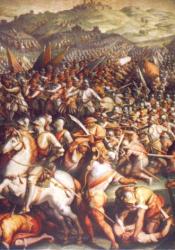The Italian Wars
Beginning in 1494, King Charles VIII of France launched an invasion of the Italian peninsula. During this time, France had already begun the transition from a semifeudal state to a nationstate, shifting France away from the medieval period toward the renaissance. Upon crossing the Alps, the French army had a significant advantage over the Italians. Their cavalry and infantry were accompanied by small, light mobile artillery that would ensure their victory. The main strategy of the Italian people was to use their heavy walls and fortifications to withstand enemy invasion. However, because of the superior firepower and effective use of cannons by the French, they were able to conquer the Italian cities with ease. The French cannons were far superior to the cannons of the Italians, which were outdated and primitive. The light, cast bronze cannons could be shot quickly and easily, making them effective for destroying walls and terrorizing the Italian population. Because of new gunpowder-fueled siege weaponry, specifically culverins and bombards, the medieval strategy of building fortresses was proving to be obsolete. The significant advancements in cannons and firearms would force the world to redesign cities and defenses, drastically reinventing the way war is waged.
The invasion by Charles VIII was only the first of many invasions of Italy through the 16th century. As the Italian Wars continued for another 60 years, Italy was constantly under threat from both foreign and domestic powers. This ongoing war led to an economic downturn that severely hindered new art or great works in Italy. Not even the church could afford to commission new art. By 1516, Leonardo Da Vinci had already left Italy to find a more welcoming artistic environment in France. By 1527, the Spanish had conquered Rome, costing Italy its "political and individual freedom" (Ewhelan). Ultimately, this would be the beginning of the end of the Italian Renaissance and the beginning of the Counter-Reformation.
Sources:
The Editors of Encyclopædia Britannica. “Italian Wars.” Encyclopædia Britannica, Encyclopædia Britannica, inc., 4 Mar. 2016, www.britannica.com/event/Italian-Wars.
“Italian Wars.” Wikipedia, Wikimedia Foundation, 21 Feb. 2018, en.wikipedia.org/wiki/Italian_Wars.
Ruggiero, Guido. The Renaissance in Italy: a social and cultural history of the Rinascimento. Cambridge Univ. Press, 2015.
The Italian Wars, 1494-1559, www.historyofwar.org/articles/wars_italian_wars.html.
“What was the impact of Charles VIIIs invasion of Italy (1494) on the Renaissance?” - DailyHistory.Org, dailyhistory.org/What_was_the_impact_of_Charles_VIIIs_invasion_of_Italy_(1494)_on_the_Renaissance%3F.
Ewhelan. “Why did the Italian Renaissance End?” Why did the Italian Renaissance End? - DailyHistory.Org, dailyhistory.org/Why_did_the_Italian_Renaissance_End%3F.

